 |

For further information, contact the MBL Communications Office at (508) 289-7423 or e-mail us at comm@mbl.edu
For Immediate Release: July 31, 2007
Contact: Gina Hebert, MBL, 508-289-7725; ghebert@mbl.edu
Is the Culprit Really our Septic Systems?
Beach closings due to high bacterial counts in the water occur with uncomfortable frequency on Cape Cod. This summer, the Barnstable County Health Department has ordered more than 40 temporary beach closures as of July 19. But sampling for the presence of bacteria which may indicate the water is contaminated with feces is still a developing science. Most testing can’t distinguish between microorganisms introduced to the environment by animal waste or by human waste, for example, so the source of the contamination – be it failed septic systems, pets or other animals, or seasonal increases in bird populations – is difficult to pinpoint.
To address these shortcomings, scientists at the MBL’s Josephine Bay Paul Center plan to take water sampling to the next level. This summer, Mitchell Sogin, Julie Huber and their colleagues are taking weekly samples at seven different sites within Little Sippewissett Salt Marsh and the adjoining Wood Neck River and Beach in Falmouth (which has twice been closed since June due to high bacterial counts). Then, using unique molecular technology developed at the Bay Paul Center, they plan to describe the different kinds of microorganisms present in water samples that have high bacterial counts. This molecular survey will describe the distribution of fecal contamination within the marsh and barrier beach area, and indicate whether animal or human wastes are the culprit at particular sites.
RESOURCES:
Article: "Woodneck Creek Closed, Opened Due to High Bacteria Counts", by Martha Scanlon (PDF format).
Reprinted courtesy of The Falmouth Enterprise
Photos: Click on thumbnails for righ-resolution images.
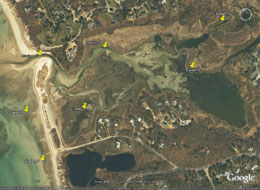 |
 |
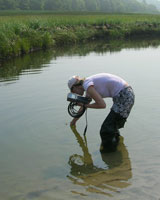 Bay Paul Center Research Assistant Leslie Graham sampling water at Wood Neck River in Falmouth. Bay Paul Center Research Assistant Leslie Graham sampling water at Wood Neck River in Falmouth. |
Wood Neck Beach (Station 1) and the adjoining Wood Neck River (Station 2) in Falmouth are popular swimming sites, but high bacterial counts in the water are a concern. MBL scientists are using a unique molecular method to determine the bacteria and other microorganisms present at seven different sites in Little Sippewissett Marsh, Wood Neck Beach and Wood Neck River. Source: Google Earth
|
|
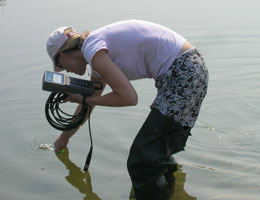 |
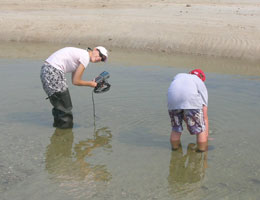 |
|
|
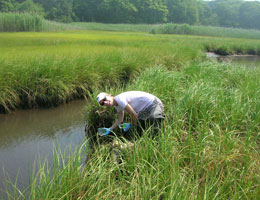 |
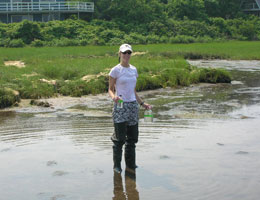 |
|
|
The MBL is a leading international, independent, nonprofit institution dedicated to discovery and to improving the human condition through creative research and education in the biological, biomedical and environmental sciences. Founded in 1888 as the Marine Biological Laboratory, the MBL is the oldest private marine laboratory in the Western Hemisphere. For more information, visit www.MBL.edu
|